Learning the warning signs of child sexual abuse is often the first step to protecting a child who is in danger.
For those who have watched the horror series “The Haunting of Hill House”, the event of Theodora “Theo” Crain joining the dots about her child client’s experience as a psychologist is unforgettable. Theo, after multiple sessions with the little girl living under foster care, comes to the crushing conclusion that the latter is actually being sexually abused by the very man who is fostering her.
A study conducted in 2013, “Child Sexual Abuse in India : Current Issues and Research”, cites another study conducted in 2012 where 160 boys and 160 girls were randomly picked across Grades 8 and 9, and in the process revealing that almost 18% of them had been sexually abused within the confines of their home.
In 2017, the WHO estimated that up to 1 billion minors between 2 and 17 years of age have endured violence in various forms including physical, emotional, or sexual violence. According to UNICEF estimates from 2014, sexual abuse (ranging from groping to rape),affected over 120 million children, representing the highest number of victims. In 2017, the same UN organization reported that in 38 low and middle income countries, almost 17 million adult women admitted having a forced sexual relationship during their childhood. (1)
These global statistics give us a fair idea about how extensive and historical the phenomenon of abuse in minors is. It has been prevalent in every cultures and society ever since a long time but have only recently become a paramount subject of methodical study.
What is child sexual abuse?
In 1999, WHO Consultation on Child Abuse Prevention adopted the definition of child sexual abuse as:
“Child sexual abuse is the involvement of a child in sexual activity that he or she does not fully comprehend, is unable to give informed consent to, or for which the child is not developmentally prepared and cannot give consent, or that violates the laws or social taboos of society. Child sexual abuse is evidenced by this activity between a child and an adult or another child who by age or development is in a relationship of responsibility, trust or power, the activity being intended to gratify or satisfy the needs of the other person.
Read Child sexual Abuse: 5 Reasons Why You Should Reveal It
This may include but is not limited to:
- the inducement or coercion of a child to engage in any unlawful sexual activity;
- the exploitative use of a child in prostitution or other unlawful sexual practices;
- the exploitative use of children in pornographic performance and materials”
Whether we like it or not, want to admit to it or not, child sexual abuse is indeed a global phenomenon. Consider the benchmarking index called “Out of the Shadows“. which includes 60 countries to throw light upon the issue, the context in which it occurs and how governments, civil societies and media come together to tackle this issue.
Read How To Heal From Childhood Trauma When Its Hampering Your Mental Health
According to this index, while the United Kingdom is the safest country for children to grow up, the Democratic Republic of Congo is the least safe.
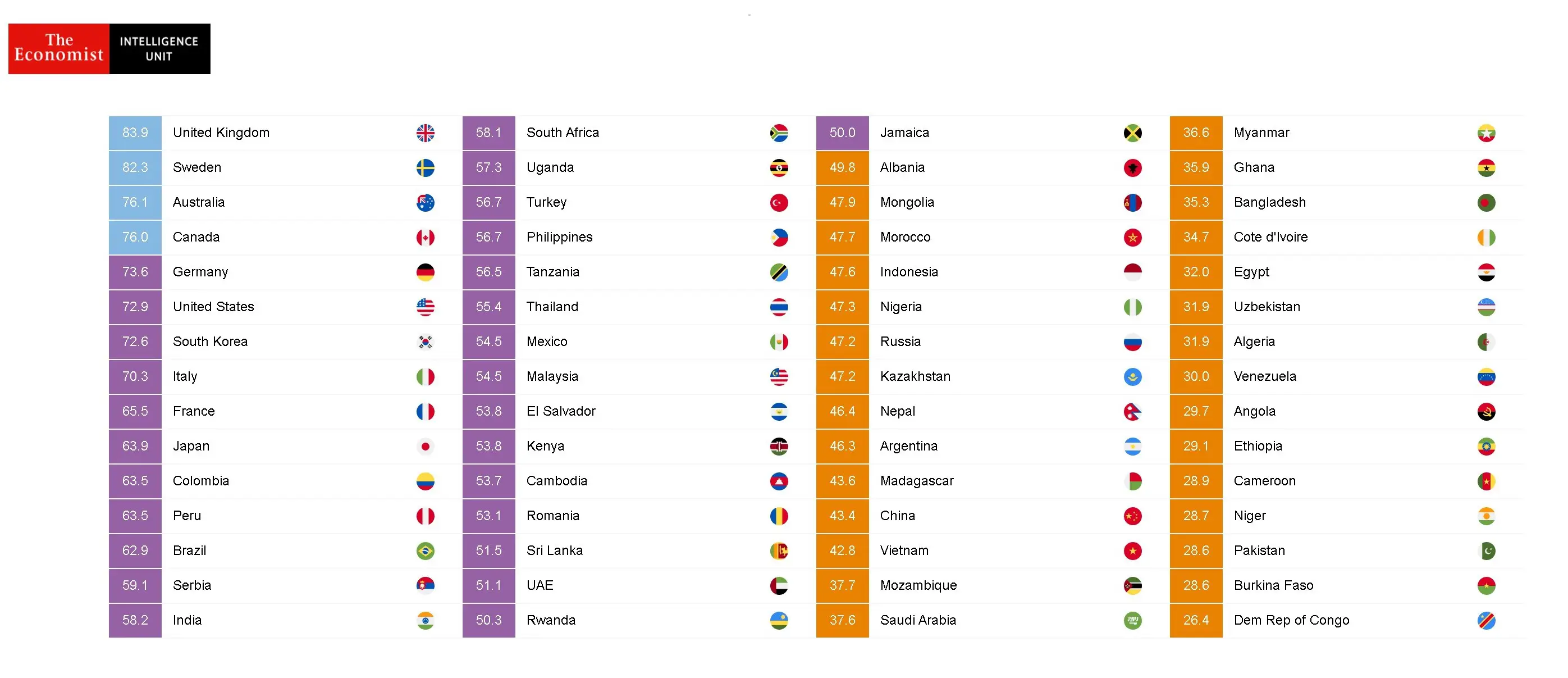
What are the dynamics of child sexual abuse?
The reason it is important to shed light on the dynamics involved in child sexual abuse is because it is different from adult sexual abuse.
Here are a list of things to remember:
- Most often than not the abuse is generally perpetrated by someone the child and the child’s family knows well. (it can be a trusted caregiver, someone very familiar to the child – school bus conductor, maid servant, known relatives or even an immediate family member.)
- Victims of child sexual abuse come from varied backgrounds including poor socio-economic backgrounds, broken homes, those mostly left unaccompanied, those with psychological disorders or cognitive issues, those with lesser social and emotional support, those who are in foster care or have been adopted.
- Disclosure in child sexual abuse is a process rather than an event. It is because most victims either have a fear of their perpetrator or believe caregivers will not believe them or both.
- Most victims prefer to disclose the details of abuse to their mothers or to a teacher.
- Retractions of complaints are common, and mostly happen if the victim senses they will not be believed or the if the perpetrator threatens them.
- A perpetrator can be both male or female, irrespective of the gender of the child.
While statistics and dynamics reveal a part of the problem, there’s much more to be done at an individual level to ensure the safety of children. Narrow down further and you’ll know safeguarding your own child against sexual abuse is perhaps one of the most basic steps you can take. But for that you have to be keenly tuned into symptoms of child sexual abuse.
Read Broadening Our Understanding of Trauma: Why Context Matters
Here are some of the signs you have to watch out for in the child to identify sexual abuse:
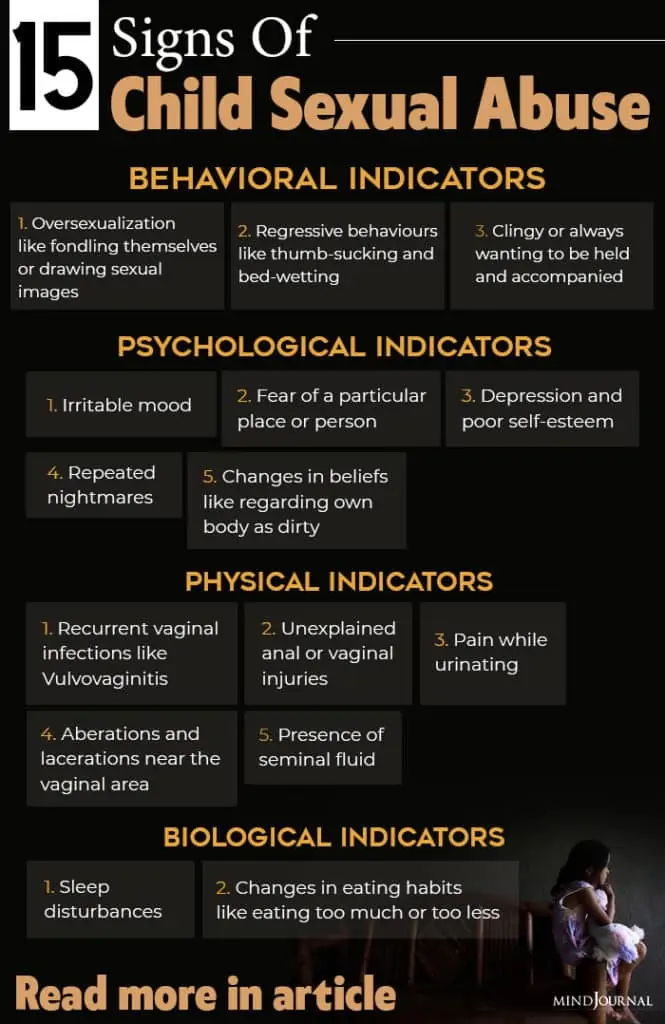
A. Behavioral indicators
A body of research has gone into discovering that child sexual abuse may indeed bring about certain behavioural changes in the said child.
1. Oversexualization
This could include kissing inappropriately (thrusting their tongue into the mouth of the person they are kissing), repeatedly masturbating or touching their privates, inappropriate (for the age, especially for children below 10) curiosity around sexuality, trying sexualized activities with other children, fondling themselves, drawing sexual images etc.
2. Regressive behaviours like thumb-sucking and bed-wetting
Other anxious responses include thumb-sucking and bed-wetting. Again excess anxiety and pent-up fear is considered to be the real reasons behind this. Behaviours such as thumb-sucking can in fact provide some self-soothing relief to the victim.
3. Clinginess
Some victims of child sexual abuse may become so fearful that they may appear to be always clingy and wanting to be held and accompanied. The real reason could be an heightened fear of the perpetrator and a need to stay away from them as much as possible.
Read Understanding and Preventing Child Abuse and Neglect
B. Psychological indicators:
1. Irritable mood
Some children show frequent changes in mood, mostly reacting violently to very trivial triggers. the child may even start using abusive words which he/she never used in the past.
Aggressive behaviour, which may stem from anger towards the perpetrator and a family or caregivers who couldn’t protect the victim, could also arise. This mood swings is the outcome of the underlying fear and anxiety effectuated by the abuse.
2. Fear of a particular place or person
A child who is undergoing abuse often has fear associated to a particular place, location or person. He/she might have unexplained periods of panic instigated by certain places or persons. It is very crucial to notice this specific sign because it helps in speedy identification of the perpetrator. The child may be scared of going to school, tuition or near a certain person who might be abusing the child.
3. Depression and poor self-esteem
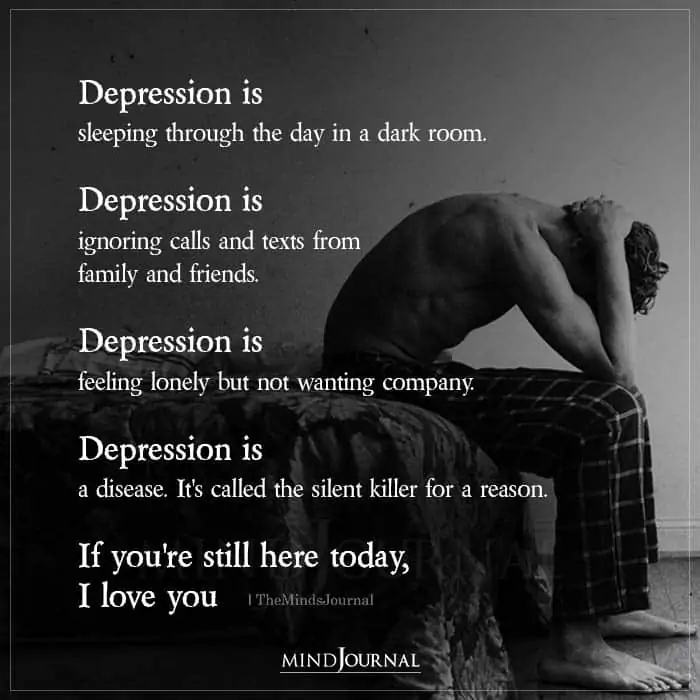
The inability to work towards disclosure and alongside, living with repetitive abuse can push children towards depression and lack of self-esteem.
The child can socially withdraw, lacking vigor and general enthusiasm in life and fail to keep up with academics.
4. Repeated nightmares
Children who are sexually abused may be traumatized by frequent nightmares that lead to broken sleep and extreme physical tiredness.
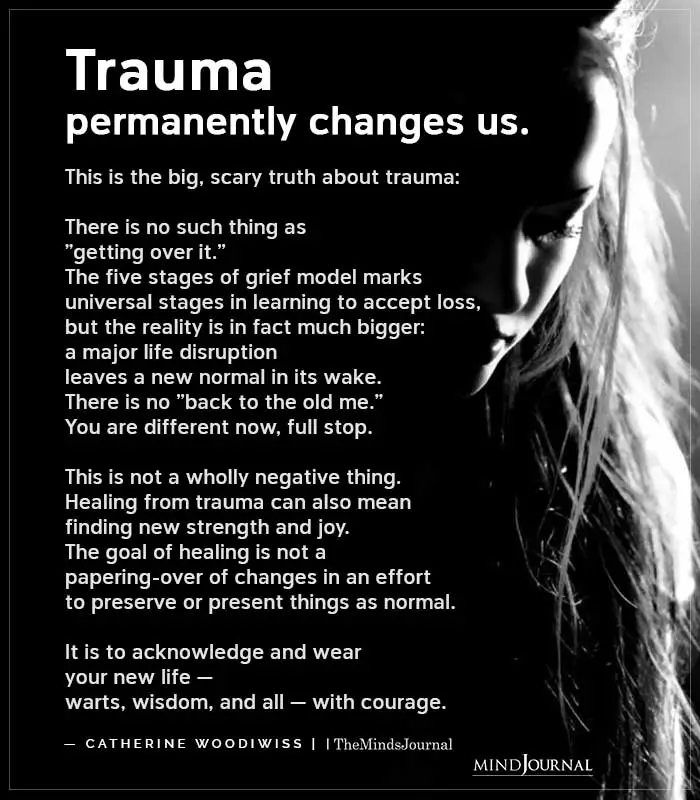
5. Changes in beliefs
A child might suddenly refuse to share a secret shared with a specific older member of the family or someone known to the child or frequent mention of a stranger who became familiar to the child. The child might start to believe that his/her body is dirty,bad or repulsive.
C. Physical indicators
Physical changes also often occur in victims of child sexual abuse and they may include some of the following –
1. Recurrent vaginal infections
Vulvovaginitis has been seen to occur among child sexual abuse victims. Any repetitive complaints of vaginal distress could have roots in sexual abuse.
2. Unexplained anal or vaginal injuries
Anal injuries usually are less common in child sexual abuse, compared to vaginal injuries. In any case, suspicion should ideally lead to a thorough investigation.
3. Pain while urinating
Along with frequent urination, pain or itchiness in vaginal area might be present in some cases of child sexual abuse. The cause could be an underlying infection, which can be ascertained only through a thorough check-up.
4. Aberations and lacerations
Major signs of trauma are usually not present in most cases. But there can be lacerations present near the vaginal area.
5. Presence of seminal fluid
This is often a clear physical indicator and must be taken seriously
Read 8 Heartbreaking Thoughts You Face As An Adult Survivor of Child Sexual Abuse
D. Biological indicators:
1. Sleep disturbances
For some children who have been sexually exploited, sleep disturbances are very common. The children might face difficulty falling asleep and as a result may appear to be fatigued and drained of energy.
2. Changes in eating habits
Anxiety caused by abuse can lead to notable changes in the eating habits of the child. Some children will eat more often to gain weight while others will shun away from eating. They may start having gastrointestinal and related problems like stomach ache, bloating, indigestion etc. Feelings of nausea and aversion to foods they initially liked is common.
Child sexual abuse is a tough subject to negotiate for victims, caregivers as well as third party investigators and law-makers.
It is not a context that a child can come to terms with or articulate easily. But if you’re a caregiver, law-maker or someone keen to understand child sexual abuse and its impact better, knowing symptoms can take you a step ahead.
References:
1. A look at child abuse on the global level
2. Signs of child abuse

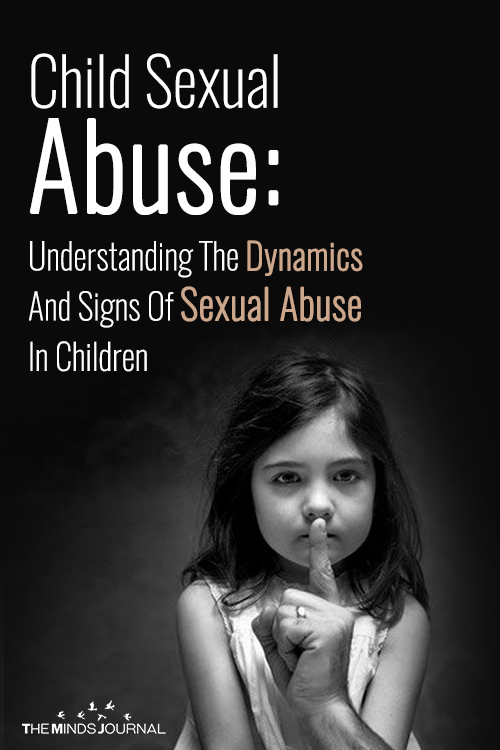
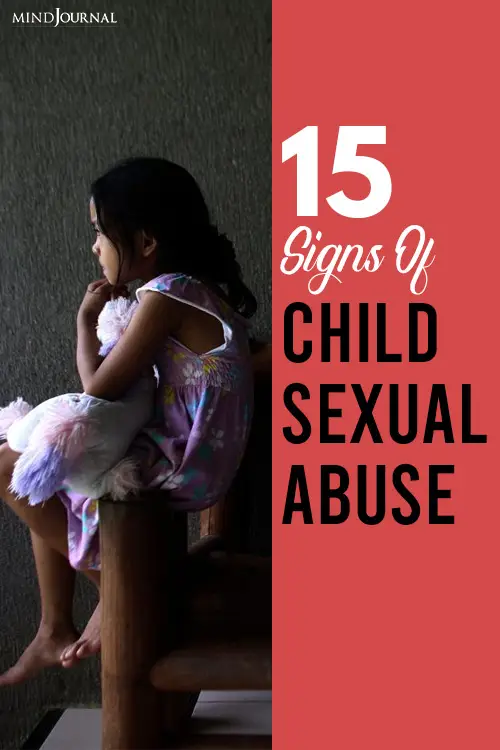
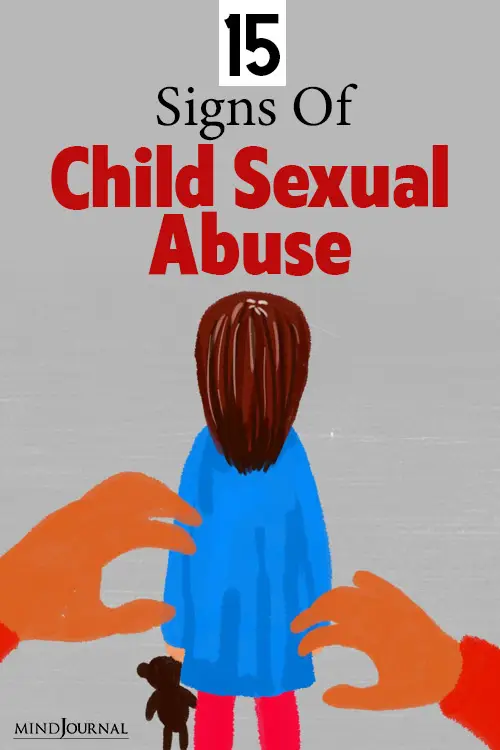
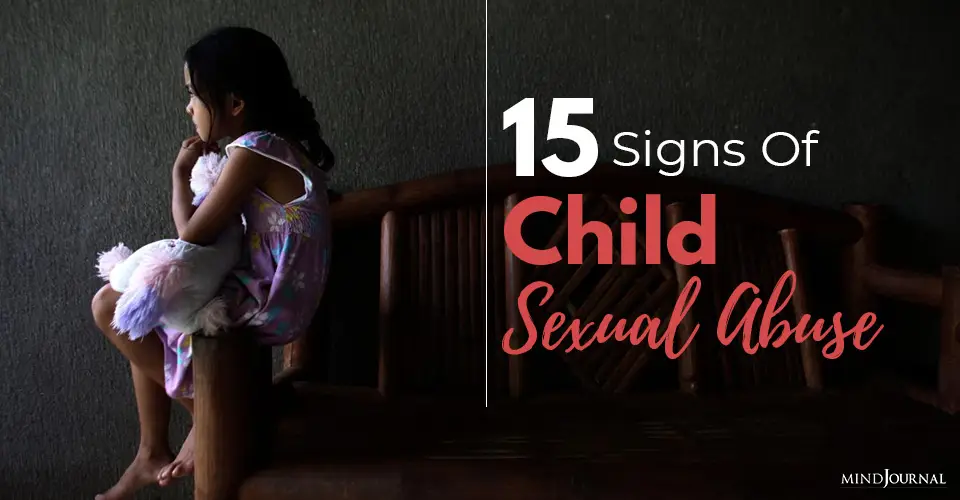







Leave a Reply
You must be logged in to post a comment.